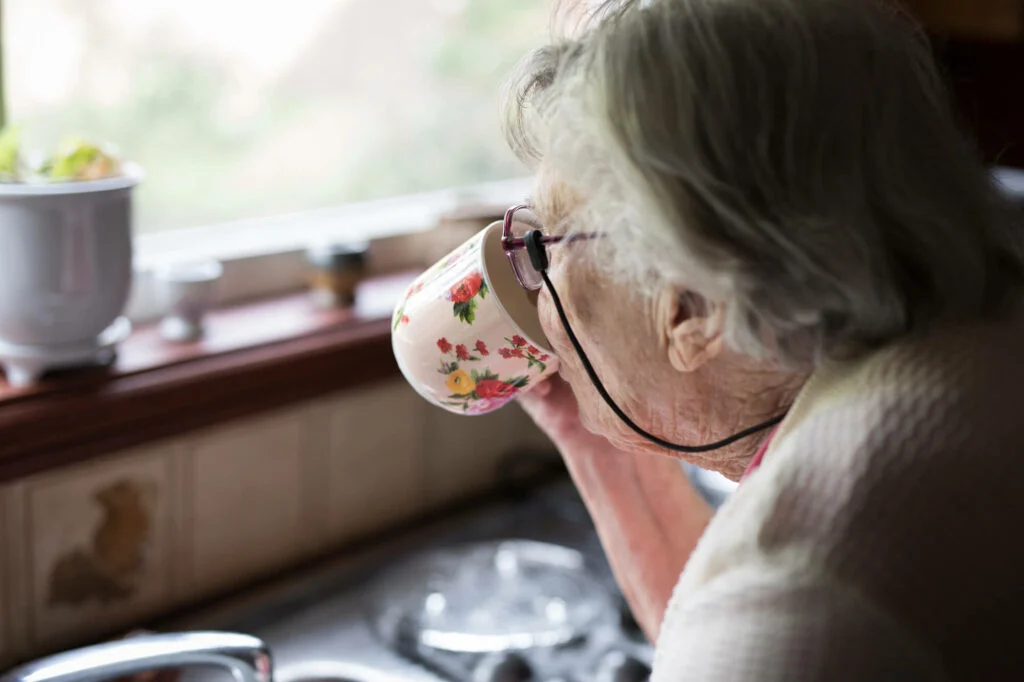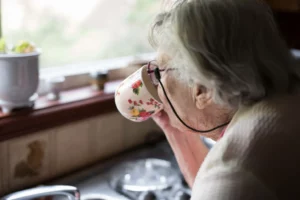Live-in Dementia Care or Nursing Homes: What’s the Difference?
Tags
Dementia Care
Dementia Live-in Care
If traditional methods of home care no longer offer the appropriate support for your loved one, you may consider 24/7 home care for them. Sometimes a person with dementia is at risk of hurting themselves and will need someone with them all the time to ensure their safety. Private live-in care can enable the person living with dementia to continue to enjoy life in their chosen environment for as long as possible.
Live-in carers often form strong bonds with those that they are caring for; the carer will be carefully character matched with your loved one in areas such as interests and personality and receive the appropriate dementia support training to enable them to deliver the best care.
The plan for private care at home will detail the care your loved one requires. This could involve physical help with aspects of personal care such as washing and dressing, or it could focus more on prompting the person to carry out these tasks for themselves. The aim of this kind of care is not simply to do everything for the care recipient; it is to promote their independence and dignity as much as possible. Some people who have dementia will need assistance with taking medication correctly, help with eating and drinking or support to communicate their needs.
The live-in carer will also carry out other duties to help with the smooth running of your loved one’s home. They will help with meal planning and will shop and prepare nutritious meals for your loved one. Laundry and light domestic cleaning will also be taken care of, so you will not need to worry about your loved one’s well-being.
Increased Choice
With private dementia care, you and your loved one can choose how they want to live. If the care recipient wants to go out, the caregiver will accompany them or in some cases can drive them to appointments or social events. Your loved one will be supported to continue to do the things they enjoy; so if gardening is their favourite hobby, the carer will help them with this too.
Dementia care at home can also include social support. Being able to maintain interests and enjoyment for as long as possible gives the person with dementia a much better quality of life, and the knowledge that care is available 24 hours a day can give you much needed peace of mind.
Dulcie’s care story
Dulcie is one of our longest serving customers. In this video, she and her family talk through their decision to arrange care in the home rather than the care home.
Care Homes and Nursing Care
Most people would prefer to remain in their own home rather than be in a dementia care home). Research has suggested that people with dementia who are admitted to care homes, including elderly care nursing homes, tend not to live as long as those who remain in their own homes.
Nursing homes are different from residential care homes because the care is supervised by registered nurses. Some nursing homes only offer general elderly care and are not suitable for people whose dementia causes them to exhibit certain behaviours. Nursing homes offering dementia care will have professionals trained in Alzheimer’s care and the challenges that can be linked to this condition.
As with any care home, your loved one would have their own room and could take a limited number of possessions with them. It is a good idea to ensure that they have the things that are important to hand, such as family photographs around them, so they do not feel so isolated. Many people living with dementia react poorly to a move into a nursing home and may become more anxious and confused than they normally are.
Staff are on duty all the time in a nursing home and all the facilities needed to caring for people with complex needs should be provided. Equipment such as hospital beds, hoisting systems and special baths can all contribute to the physical care of those who have mobility problems and need more assistance than would normally be possible at home.
Some nursing homes have doors that are kept locked to prevent people who are prone to wandering from getting lost. If this kind of behaviour has become an issue with in-home care and it has not proved possible to secure your loved one’s property well enough to keep them safe, you may need to consider a move into a nursing home.
When Nursing Home Care is Needed
The longer you can provide care and support at home for your loved one, the better their quality of life will be. However, there may come a time when staying at home is impossible and they could be at serious risk of harm, so you should not feel guilty if you have to make the decision to admit your loved one to a nursing home.
If skilled nursing care is required 24 hours a day, or more than one carer to support your loved one, it may be in their best interests to go into a home where their needs can be met more fully.
If you enable your loved one to enjoy as much independence as possible before this situation arises, you know you have done your best for them.
Call us for expert live-in care advice
0333 920 3648
From dealing with a diagnosis and understanding the implications to getting advice on how to live well with the condition, our extensive resources will help guide you through what can be a tough and emotional moment.
Learn more about dementia care
Take a look at more Elder guides on living with and caring for dementia.

Dementia care – how do I pay for it?
Dementia Live-in Care: How Do I Pay for It? If your loved one is living with dementia, it can be difficult to work out

Types of dementia
Common types of dementia Every dementia journey is different, and not everyone will experience the same symptoms. However, understanding the different types of dementia

What are the signs of dementia in women?
Did you know women have a greater risk of developing dementia over their lifetime than men? 600,000+ women in the UK are currently living

Dementia and sundowning – advice for caregivers
Dementia care – what is sundowning? Sundowning – sometimes referred to as ‘late-day confusion’ – is a symptom that causes those living with dementia

Discrimination and dementia
Overcoming discrimination and stigma can be a huge challenge for those living with dementia. We’ve looked at some of the common situations where people

Recognising the signs of frailty in someone with dementia
By understanding and recognising frailty, you can help a person with dementia to access the right care, reduce the risk of ending up in